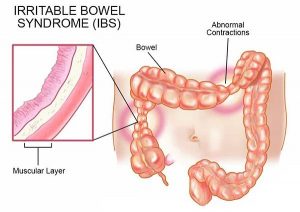Irritable bowel syndrome
Irritable bowel syndrome (IBS) is a common disorder that affects the large intestine. Signs and symptoms include cramping, abdominal pain, bloating, gas, and diarrhea or constipation, or both. IBS is a chronic condition that you’ll need to manage long term.
Only a small number of people with IBS have severe signs and symptoms. Some people can control their symptoms by managing diet, lifestyle and stress. More-severe symptoms can be treated with medication and counseling.
IBS doesn’t cause changes in bowel tissue or increase your risk of colorectal cancer.

Symptoms
The signs and symptoms of IBS vary. The most common include:
- Abdominal pain, cramping or bloating that is typically relieved or partially relieved by passing a bowel movement
- Excess gas
- Diarrhea or constipation — sometimes alternating bouts of diarrhea and constipation
- Mucus in the stool
Most people with IBS experience times when the signs and symptoms are worse and times when they improve or even disappear completely.
IBS pain
IBS pain may feel like cramping. With this cramping, you will also have at least two of the following experiences:
- some relief of pain after a bowel movement
- a change in how often you have a bowel movement
- changes in the way your stools look


